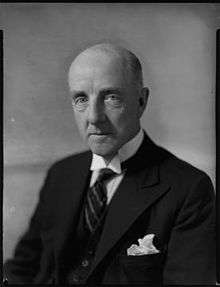Harold Morris (politician)
Sir Harold Spencer Morris MBE (21 December 1876[1] – 11 November 1967) was an English barrister, judge and National Liberal MP.

Family and education
Harold Morris was born in Highbury, London,[2] the son of Sir Malcolm Morris, KCVO, the eminent surgeon and dermatologist.[3] He was educated at Clifton College[4] and Magdalen College, Oxford. Morris married Olga Teichman of Chislehurst. They had one son and four daughters.[5]
Career
Morris graduated in law from Oxford. He was called to the Bar by the Inner Temple in 1899 and joined the South-East Circuit. Between 1914–1919 he served the Coldstream Guards, including two and half years service in France[6] was mentioned in dispatches and awarded the military MBE. He took silk in 1921 and was the same year appointed Recorder of Folkestone, serving until 1926. One of his first cases as a barrister was appearing on behalf of Vernon Henry St John in his peerage claim, which was something of a scandal at the time. From 1926–1945 he served as President of the Industrial Court and from 1925 he was Chairman of the National Wages for Railways.[5] He was knighted in 1927.[5] In 1929, Morris was appointed Chairman of the Committee on Unemployment Claims[7] and from 1930–1935 he was Chairman of the Coal Wages Board.[8] In the 1940s he was elected a member of the Royal Institution.[9] In 1944 he was Chairman of the Court of Inquiry set up by the Minister of Labour and National Service to look into the wages and hours of work obtaining in the woolcombing section of the wool textile industry in Yorkshire.[10] He retired from legal work in 1945, aged 70 but maintained directorships of a number of companies.[11]
Peel Commission
In 1936, Morris was appointed as a member of the Palestine Royal Commission, or the Peel Commission, which was set up to look into the disturbances between the Arab and Jewish populations of the British Mandated Territory of Palestine.[12] The Commission recommended that there should be a Jewish national state in north and west of Palestine and an Arab state in the east and south.[13] However the government rejected the Commission's proposal to partition Palestine.
Politics
At the 1922 general election, Morris was selected as the Lloyd George National Liberal candidate for Bristol East. Bristol East had been a Liberal seat since its creation in 1885 and had been held by Sir Charles Hobhouse. It was fought and won in 1918 by George Bryant Britton as a Coalition Liberal in opposition to Hobhouse who remained an Independent Asquithian. However Britton did not wish to stand again in 1922 and Morris was chosen to replace him. He faced a straight fight with Labour and just held the seat with a majority of 151 votes.[14] At the 1923 general election Morris was again involved in a straight fight against Labour. Despite the surge in support for the re-united Liberal Party at this election nationally, Morris was unable to hold onto his seat, losing to Labour's Walter John Baker by 2,040 votes.[15] After this election Morris decided to concentrate on his legal career and did not stand for Parliament again.
Death
Morris died at his home at 21 Lichfield Road, Kew, in Surrey, on 11 November 1967 aged 90.[11]
Publications
- The Barrister, Geoffrey Bles, London 1930
- Back View, Reminiscences including a Biography of Sir Malcolm Alexander Morris, Peter Davies, London, 1960
References
- 1939 England and Wales Register
- 1911 England Census
- The Times, 21 February 1924 p15
- "Clifton College Register" Muirhead, J.A.O. p160: Bristol; J.W Arrowsmith for Old Cliftonian Society; April, 1948
- Who was Who, OUP 2007
- The Times, 16 November 1922 p6
- W. R. Garside, British Unemployment 1919–1939: A Study in Public Policy; Cambridge University Press, 2002 p50n
- The Times, 13 November 1967 p10
- Proceedings of the Royal Institution of Great Britain, 1943 p420
- George Sayers Bain & G. B. Woolven, A Bibliography of British Industrial Relations; Cambridge University Press Archive, 1979 p174
- The Times, 13 November 1967 p16
- Deborah Hart Strober & Gerald S. Strober, Israel at Sixty: An Oral History of a Nation Reborn; John Wiley and Sons, 2008 p43ff
- "Archived copy". Archived from the original on 30 August 2008. Retrieved 1 February 2009.CS1 maint: archived copy as title (link)
- F W S Craig, British Parliamentary Election Results 1918–1949; Political Reference Publications, Glasgow, 1949, p 196
- F W S Craig, British Parliamentary Election Results; 1949, p 196
| Parliament of the United Kingdom | ||
|---|---|---|
| Preceded by George Bryant Britton |
Member of Parliament for Bristol East 1922–1923 |
Succeeded by Walter John Baker |